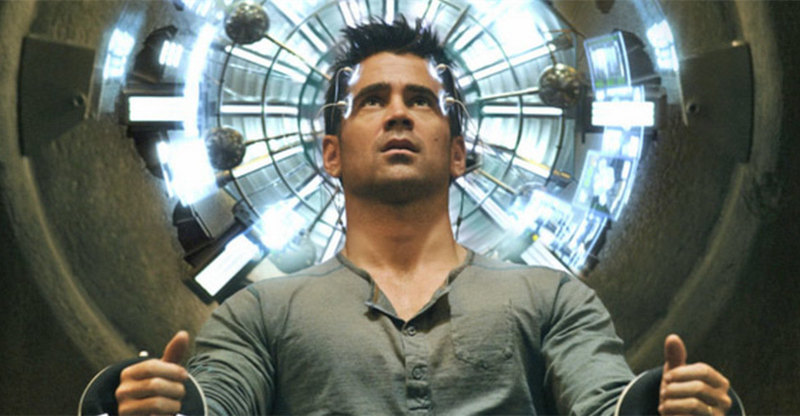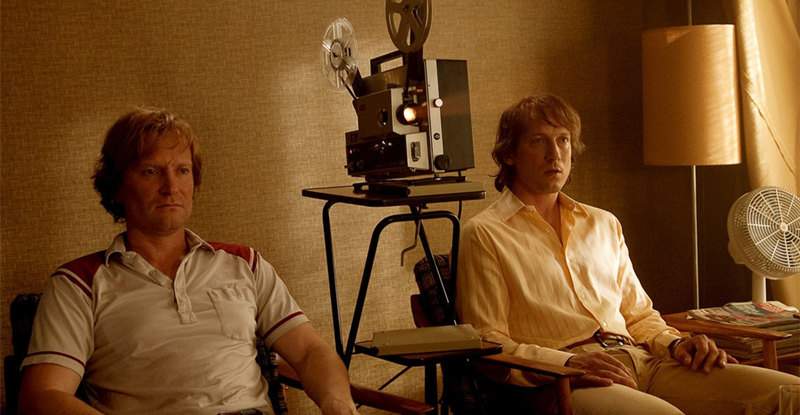I have so much to say about “Marketa Lazarova” (1967) that I feel I should only say a little. Even a brief report so soon after seeing such a remarkable film is like relating the experience of riding out a hurricane before having a chance to dry off. Czech filmmaker Frantisek Vlacil’s historical epic is a sensory overload, all whirls and eddies and ruptures, a deluge that defies the viewer to stay afloat. At this point I can only tread water, but I am certain of one thing. I have just seen a masterpiece.
Out of the film’s gallery of stark black-and-white images, one that lingers with me is the nearly static portrait of a pack of wolves hunkered in the snow and glaring at the camera. All menace and glower, if they were just a little more aware, they would be running like hell from the human predators who stalk this medieval landscape. The wolves don’t stand a chance in the presence of God’s (or the gods’) most blighted creation, opportunistic cowards who pounce on any sign of weakness, consuming everything and everyone around them before eventually feeding on themselves.
A cursory plot summary won’t help much, but here goes. In the 13th century, Czech tribal bands feud with each other and with ruling German nobility. The Kozliks are perhaps the most rapacious; Mikolas and his one-armed brother Adam scour the countryside for stragglers to slaughter and pillage. The Lazar clan is more mercantile than mercenary, but no less vicious when they sense personal gain. The Lazars brutalize Mikolas, the Kozliks strike back by kidnapping the senior Lazar’s beloved and virginal daughter Marketa. Along the way, the Germans get pissed off (sorry for the spoiler), blood flows, and severed limbs fly. This doesn’t even begin to describe the movie.
Vlacil was adapting a widely respected novel of the same title by Czech writer Vladislav Vancura. Vancura’s work is described alternately as Joycean and untranslatable, and I have now exhausted my knowledge on that subject. If Vancura’s book is indeed largely impenetrable, Vlacil has done an extraordinary job of capturing that essence on screen.
“Marketa Lazarova” is a stylistic tour-de-force that feels simultaneously primitive and modern, a flurry of widescreen compositions that dazzle and disorient with their variety: zooms and rapid pans mixed in with frontally staged tableaux. The film constantly shifts scale and perspective, cutting from barren vistas to extreme close-ups of wide-eyed faces and moving from objective shots to free-ranging POVs. One of Vlacil’s favorite techniques is the floating, first-person shot that stumbles over rocky terrain, glides through snow-covered pine branches, or peeks around corners in crumbling buildings. Perspective isn’t always clearly indexed to a character. In one sequence, an unidentified off-screen speaker addresses a series of anxious listeners at close quarters, specimens pinned to corkboard by a merciless camera.
The film’s use of sound is even more astonishing. Voices (which I assume were recorded later) have a disembodied quality, often echoing as if delivered over a P.A. in a vast, empty auditorium, lending scenes a slightly surreal quality. The score, composed by Zdenek Liska, is punctuated by choral outbursts that provide an aural match to the sudden torrents of heavenly light that periodically envelop this hellish world. Bells and other percussion instruments resonate as fools play out their petty dramas while nature continues not to give a damn about any of them.
It’s a world ruled by cruelty and by the stupidity and vanity that produces such predation. Yet there are still moments when signs of life, of genuine consciousness, briefly flourish. In one scene, Lazar smiles at the sight of his angelic daughter Marketa, all innocence and potential, skipping playfully through the snow. The misery that follows immediately after is all the more devastating in contrast to the grace of this privileged moment, but the temporary respite is still something to cling to.
I have not come close to doing justice to “Marketa Lazarova.” I’m not entirely sure what happens in the movie, and I find it a challenge even to keep track of the basic relationships among the characters. Vlacil is more interested in impression than clarity, and poetry over narration. The film races from one visual match to the next, juxtaposes seemingly disparate sounds and images, and gives the viewer little time to recover from one sensory assault before launching its next salvo. It even offers unexpected moments of levity amidst the suffering: a wandering priest who really loves his “lamb of God,” and an exchange between a testy man and his unseen hecklers that consists of “Fuckers!” and “Obnoxious ass!”
But this is the best I can do after one shot at a movie that begs to be revisited, one that will no doubt both open up and further perplex on multiple viewings. For now I’m content to bask in the audiovisual rhapsody.
Video:
The film is presented in its original 2.35:1 aspect ratio. The film was restored in 2011 and this digital master was taken from that 4K digital restoration. As we see in the feature about the restoration (see below), the film was corrected on a frame-by-frame basis and there’s no way to know exactly how much buffing and polishing really went on. It’s possible the film has been significantly boosted to achieve the final look. Whatever the case, the restored image is startlingly clear. I was knocked out by one shot when the camera pushes through snow-covered branches that stood out in such vivid detail it was almost like being in the forest.
There are several very high-contrast b&w shots and this transfer still preserves a sense of detail in what I imagine looked pretty washed out and blurry before restoration. This 1080p transfer is just beautiful.
Audio:
The linear PCM mono track is flat but sharp. The flatness is a selling point because of the film’s unique audio design; the disembodied voices sound completely isolated as they should. Optional English subtitles support the Czech and German audio.
Extras:
“Marketa Lazarova” has been criminally underexposed in the States and Criterion has offered a fine collection of extras to help introduce the film to a wider audience.
“In The Web Of Time” (21 min.) is a 1989 documentary directed by cinematographer Frantisek Uldrich. It primarily consists of an interview with director Frantisek Vlacil along with clips from several of his films. He discusses his somewhat unorthodox background (he learned to make movies while in the military rather than going to film school) and his emphasis on visual style.
The disc also includes several other interviews. Film historian Peter Hames (2013, 18 min.) provides background about Vlacil’s career. Film critic and journalist Antonin Liehm (2013, 9 min.) knew Vlacil personally and discusses his work on the movie. Costume designer Theodor Pistek (2013, 27 min.) gives a lengthy talk about the authentic and elaborate period costumes.
We also get a lengthier feature (2013, 40 min.) which includes interviews with three of the film’s cast members: Magda Vasaryova (who played Marketa), Ivan Paluch (one-armed Adam), and Vlastimil Harapes (who played Christian, the kidnapped son of a German noble).
Criterion has also included a short feature (2011, 9 min.) about the film’s digital restoration. Ivo Marek, technical director of Universal Production Partners studious, takes viewers on a tour of the arduous path to the film’s frame-by-frame restoration.
We also get a gallery of 29 storyboard drawn by Vlacil and a Theatrical Trailer (2 min.)
The thick 40-page insert booklet includes an essay by the great critic Tom Gunning, a piece by translator Alex Zucker about the Vancura novel, and a transcript of a 1969 interview with Frantisek Vlacil, conducted by Antonin Liehm.
Film Value:
In 1998 “Marketa Lazarova” was voted the best Czech film of all-time in a poll of Czech and Slovak critics and filmmakers. It’s easy to see why, even if it isn’t easy to describe such a unique and complex film. It’s been quite a while since Criterion (Eclipse collection aside) released a title I was completely unfamiliar with, and I am thrilled to have been floored by it. Unless you’ve seen it, you’ve never seen anything like it.


